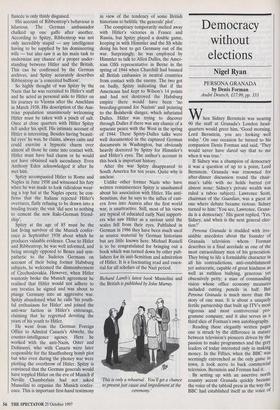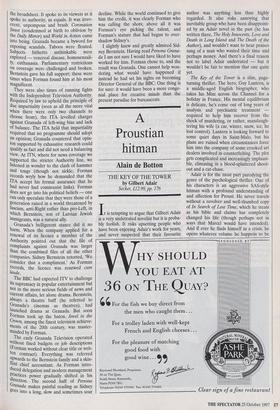Democracy without elections
Nigel Ryan
PERSONA GRANADA by Denis Forman Andre Deutsch, £17.99, pp. 333 When Sidney Bernstein was nearing 90 the staff at Granada's London head- quarters would greet him, 'Good morning, Lord Bernstein, you are looking well today.' On one occasion he turned to his companion Denis Forman and said, 'They would never have dared say that to me when it was true.'
If Sidney was a champion of democracy it was a question of up to a point, Lord Bernstein. Granada was renowned for after-dinner discussion round the chair- man's table with no holds barred (or almost none: Sidney's private wealth was ruled a taboo subject). Lawrence Scott, chairman of the Guardian, was a guest at one where debate became riotous. Sidney turned to him: 'You see, Lawrence, Grana- da is a democracy.' His guest replied, 'Yes, Sidney, and when is the next general elec- tion?'
Persona Granada is studded with irre- sistible anecdotes about the founder of Granada television whom Forman describes in a final accolade as one of the most extraordinary men of his generation. They bring to life a formidable character in all his contradictions, anti-establishment yet autocratic, capable of great kindness as well as ruthless bullying, generous yet obsessively petty; a man of commanding vision whose office economy measures included cutting pencils in half. But Persona Granada is much more than the story of one man. It is about a uniquely fertile partnership that built up ITV's most vigorous and most controversial pro- gramme company, and it also serves as a third slice of Forman's own autobiography. Reading these elegantly written pages one is struck by the difference in stature between television's pioneers driven by the passion to make programmes and the grey leaders of today interested only in making money. In the Fifties, when the BBC was seemingly entrenched as the only game in town, it took nerve to back commercial television. Bernstein and Forman had it.
By setting up with an assertive north country accent Granada quickly became the voice of the tabloid press in the way the BBC had established itself as the voice of the broadsheet. It spoke to its viewers as it spoke to authority, as equals. It was irrev- erent, unpompous and brash. Coronation Street (condemned at birth to oblivion by the Daily Mirror) and World in Action came into being. Granada became a byword for exposing scandals. Taboos were flouted. Subjects hitherto unthinkable were explored — venereal disease, homosexuali- ty, euthanasia. Parliamentary restrictions on coverage were challenged and broken. Bernstein gave his full support; these were times when Forman found him at his most magnificent.
They were also times of running fights with the Independent Television Authority. Required by law to uphold the principle of due impartiality (seen as all the more vital when there were only two channels to choose from), the ITA levelled charges against Granada of left-wing bias and lack of balance. The ITA held that impartiality required that no programme should adopt an opinion; Granada countered that opin- ion supported by exhaustive research could qualify as fact and did not need a balancing view. At ITN, where for news coverage we supported the stricter Authority line, we listened in wonder to the clash of hammer and tongs (though not sickle; Forman records wryly how he demanded that the ITA accept his formal assurance that he had never had communist links). Forman does not go into his political beliefs — one can only speculate that they were those of a generation raised in a world threatened by fascism, anti-Right rather than pro-Left, in which Bernstein, son of Latvian Jewish immigrants, was a natural ally.
Granada's belligerent stance did it no harm. When the company applied for a renewal of its licence a member of the Authority pointed out that the file of complaints against Granada was larger than the combined files of all the other Companies. Sidney Bernstein retorted, 'We Consider that a compliment.' As Forman records, the licence was renewed cum laude.
The BBC had expected ITV to challenge its supremacy in popular entertainment but not in the more serious fields of news and Current affairs, let alone drama. Bernstein, always a theatre buff (he referred to Granada's cinemas as theatres), had launched drama at Granada. But soon Forman took up the baton. Jewel in the Crown, among the finest television achieve- ments of the 20th century, was master- minded by Forman. The early Granada Television operated without fixed budgets or job descriptions (Forman worked without clear title or writ- ten contract). Everything was referred upwards to the Bernstein family and a skin- flint chief accountant. As Forman intro- duced delegation and modern management practices power gradually shifted in his direction. The second half of Persona Granada makes painful reading as Sidney goes into a long, slow and sometimes sour decline. While the world continued to give him the credit, it was clearly Forman who was calling the shots; above all it was Forman's eye picking the talent, and Forman's stature that had begun to over- shadow Sidney's.
I slightly knew and greatly admired Sid- ney Bernstein. Having read Persona Grana- da I am not sure I would have liked to have worked for him. Forman chose to, and the result was Granada. One cannot help won- dering what would have happened if instead he had set his sights on becoming Director General of the BBC. One thing is for sure: it would have been a more conge- nial place for creative minds than the present paradise for bureaucrats.



















































































 Previous page
Previous page